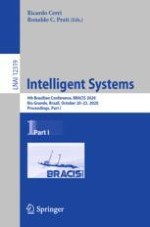2020 | OriginalPaper | Chapter
Can Twitter Data Estimate Reality Show Outcomes?
Authors : Kenzo Sakiyama, Lucas de Souza Rodrigues, Edson Takashi Matsubara
Published in: Intelligent Systems
Publisher: Springer International Publishing
Activate our intelligent search to find suitable subject content or patents.
Select sections of text to find matching patents with Artificial Intelligence. powered by
Select sections of text to find additional relevant content using AI-assisted search. powered by
